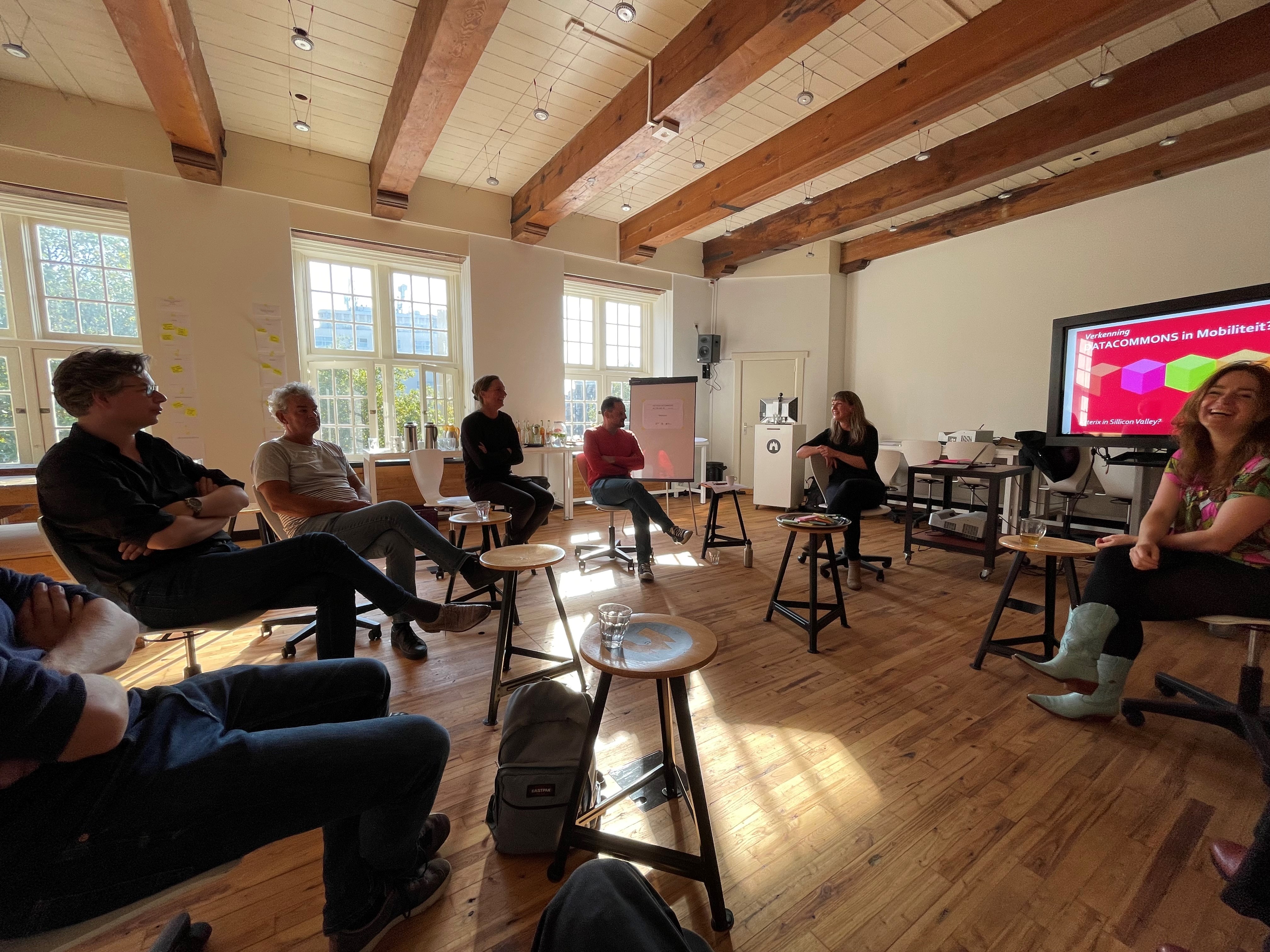Exploring the potential of mobility data commons in Amsterdam
The Chief Technology Office (CTO) of the Municipality of Amsterdam and Waag are exploring innovative ways of collaborating with businesses and societal organisations on data collection and sharing for the benefit of better cycling policies, good data practices and happy cyclists. Mobility data collection and governance are currently dominated by large technology companies. Those companies often have exclusive control over what happens with the data. The city of Amsterdam is looking for good examples in the governance of data and cocreation of public value together with citizens, local stakeholders and SMEs. This calls for alternative data governance models. Against the backdrop of the smart city concept growing in popularity, Waag and the City of Amsterdam organised a series of two social policy labs, in which we explored the potential of a data commons model with relevant stakeholders, using a co-creation methodology.
A data commons is a new collaboration model for locally sharing mobility data. It could mean true innovation in the governments’ data practices for policymaking. Instead of collecting data about citizens, a data commons facilitates a local governments’ cooperation with citizens and organisations as a central mechanism in its policy practices.
Goal
Central aim of this second series of the social policy labs was defining a shared vision on a data commons and formulating a roadmap towards a functioning data commons, focusing on the value for citizens, bicycle service providers and bicycle (mobility) policy makers, putting privacy and safety of citizens first.[1]
Social Policy Labs Labs
The social policy labs’, guided by Vera de Jong, offered a space to work on development of a data commons for local government and stakeholders in the mobility domain, for the benefit of happier cyclists and better data practices. Participants of the labs were a data specialist, a policy maker of ‘Programma Fiets’, members of the Chief Technology Office (all municipality of Amsterdam), the small Bike-Data enterprise (Ring-Ring), Dutch Bike Union, and Waag. After a series of individual preparatory conversations, we organised two 3-hours workshops on the 29th of October and on the 23rd of November. In small group brainstorms we worked on use cases for the data commons and next steps to take for a prototype.
Outcomes
Especially the first (live) lab resulted in high energy and enthusiasm to make this collaboration work. The participants/partners have formulated what they see as the potential of a data collaboration for better cycling experience in Amsterdam:
Firstly, the aim is to change the power relations in data practices and make residents active players in ‘data-driven’ policy making. Currently the municipality uses (and buys) different types of data that are ultimately produced by cyclists. Participants of the workshops envisioned how a data commons could offer possibilities for residents to have a say in data collection practices that support them in their needs. Ring-Ring offers cyclists the possibility of earning money for collectively defined goals by cycling kilometres, while contributing to data collection about the routes they choose. Such mechanisms could ideally be built onto the basic infrastructure of the data commons.
Secondly, the data commons would make it possible to benefit as a city from improved insight for good cycling policies. A collaboration of various actors can result in harvesting, fusing and curating data from heterogeneous sources. Think of data on congestion, routes, infrastructure but also experiences in traffic. Getting insight from heterogeneous data sources can improve the information base that cycling advocates (within and outside the municipality organisation) can currently work with and foster comprehensive policy that breaks down silos.
Thirdly, the development of this data commons can be a means to learn about this new model for data governance for various domains. Starting off with a specific use case (happy cyclists) and a city (Amsterdam) we try to get a better understanding of the functional requirements of building a data commons. Participants agreed to be open about the process so that our process can benefit others aiming for more open and fair data governance models.
Difficulties
During the labs several ethical concerns were discussed. There is a risk in ‘data-driven policy’ when data models become predominant in decision making while data is but one source of information and always a simplification of reality. Moreover, how to deal with data on residents’ bike routes, where a lot of personal information is revealed? Agreements should be made on who has access to this data, on what aggregated level, and what members of the data commons are allowed to do with it. How can members guarantee that data is only used for the agreed purposes and that ideas and concerns of residents will remain guiding principles in the use of the data commons? Questions that all have to be addressed the following months when taking more concrete steps in building the data commons for cycling happiness.
Next Steps
Participants of the social policy labs are fine tuning the project plan to take the ambitions forward and they are fine tuning a Memorandum of Understanding for the ‘Data commons fietsgeluk’. A shared ambition, formulated in that MoU is the aim to bring together data of the participating organisations, collect necessary additional data with cyclists and analyse the data through visualisations and simulations. While the partners will now dive into the technical questions of actually building the data commons, the Memorandum will function as a reminder of our spot on the horizon. Happier cyclists and fair data practices!
[1] Nathalie van Loon, project leader at CTO Amsterdam recently published an article focusing on the question 'can or should a local government organize a data commons in order to enable parties to share data in a trusted, fair and economic way while observing privacy and security concerns?' (Van Loon, N. & R. Snijders, 2021)

